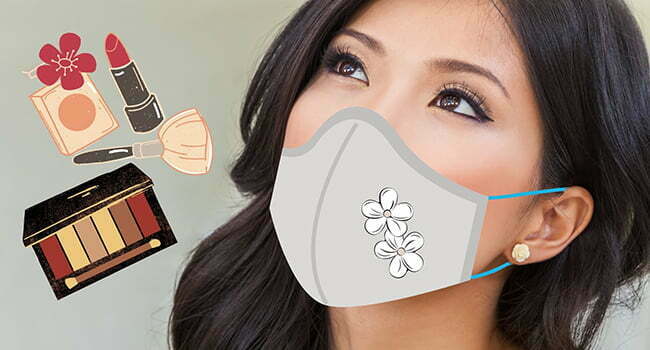Beauty in Times of Pandemic: “Mask Economy” in the Chinese Market
The pandemic has brought significant changes to all walks of life in many countries. Faced with the challenge of the new normal, China’s skincare and cosmetic industry started to adapt and grow with the pain that global economy still endures.
“Mask Makeup” Prevails in China
After China resumes work and school, people need to wear masks to aid the country from ongoing outbreak. Under the circumstances, wearing eye makeup for women has become extremely important. In China, the eyes are called “the window to the soul”, so the demand for eye makeup has increased.

In February 2020, Pinduoduo New Consumer Research Institute released the article “Best Sellers After the Resumption of Work”. According to the statistics, the search volume for products such as eye shadow pans and eyebrow pencils have increased by 290% year-on-year. At the same time, the popularity of lipsticks has dropped significantly during the pandemic.
The popularity of eye makeup also drives the demand for related skincare products such as eye creams and eye essences. Due to home isolations, many people have to work from home and spend longer time on digital screens, so they act to prevent or resolve eye problems through related skincare products.
Strong Demand for High End Skincare Products in China
In addition to eye makeup, there is also a growing demand for high end skincare products. Perfumes and beauty equipment have also received more attention. As customers of beauty salons also declined, home beauty equipment gradually becomes a new rigid demand. Alibaba’s online shopping tool Tmall, stated that from January to November 2020, the cumulative transactions of home beauty products exceeded 5 billion, a soaring 50% year-on-year increase.
Because of the pandemic, consumers have also faced skin problems due to prolonged wearing of masks. Therefore, many have considered skincare products for acne removal and prevention. The Estee Lauder Group’s quarter 2 of 2021 report showed that skincare and perfume sales have become the main driving force for growth, with skincare revenue increased by 28% and perfume products by 6%.
Beauty Market Strategy: Online and Offline Integration
Around 2010, a number of foreign beauty and cosmetic brands withdrew from the Chinese market paving the way to the rise of local brands and distributors. WOW COLOUR, THE COLORIST, HAYDON black hole, HARMAY Huamei have opened in the major shopping malls across the country.
Majority of the local makeup brands that are available in WOW COLOUR stores include Judou, Colorkey, Huazhizhi, VENUS MARBLE, Girlcult, CLIO, Holdlive, VNK, Kaledos, Jill Leen, Miss Candy nail polish and many other Chinese cosmetics that are popular on the internet.
The advent of customer-centric retail model in the beauty collection stores has also opened up new ideas for offline retail. In-store shopping experiences such as beauty makeup egg walls, photo check-in areas as well as one-stop, self-service shopping counters are provided to engage the customers. Attractive online advertisements are available in various e-commerce and social media platforms such as Xiaohongshu and Douyin/TikTok.
The Rapid Growth of Online Beauty Sales
Evidently, the outbreak of Covid-19 has caused offline cosmetic retail channels to decline. Even after restriction is lifted, many businesses remain closed. At the same time, the consumptions of foreign products have gradually shifted to domestic supplies. However, e-commerce has emerged and online sales started to rise.
On January 26, 2021, LVMH released its 2020 fiscal year and fourth quarter financial report. The total revenue of beauty and fragrance business fell 22% year-on-year to 5.248 billion euros, and continued business profit fell 88% year-on-year. The group said that the decline was due to restrictions on international travel, reduction of tourists and plummeting beauty products consumption. On the other hand, the total sales of L’Oréal China in 2020 has increased by 27% with its online sales accounted for 60%. The company’s total sales has increased by 56% compared to 2019.
On the other hand, Estee Lauder outside China adjusted its strategy and optimized its brand matrix and channel layout. The “Post-pandemic Business Acceleration Plan” mentioned by the group included the closures of many underperforming retail stores, travel retail counters and stores in Latin America. Among the many adjustment strategies, digital channel has become the leader in the beauty industry.
According to Mintel data, the pandemic has accelerated the shift of consumers to online channel and forced the innovation and transformation of the beauty companies. 60% of Chinese female consumers prefer to discover new skincare brands and trends online. Moreover, the immersive entertainment retail experience is becoming even more popular while “offline personalized experience and online convenient purchase” has become the new trend.
Conclusion
As the requirement to wear face masks continues, Chinese female consumers focus more on what they can demonstrate to others, creating a new economic form under the pandemic: the mask economy. Compared to lipsticks that used to sweep the country, eye makeup and perfumes now become more essential. When choosing the skincare products to purchase, consumers focus more on the items with sun protection, acne treatment and good for sensitive skin. In retrospect, the pandemic has accelerated the shift of consumers to digital channels and forced the innovation and transformation of the beauty and cosmetic industry in the China market to thrive.
